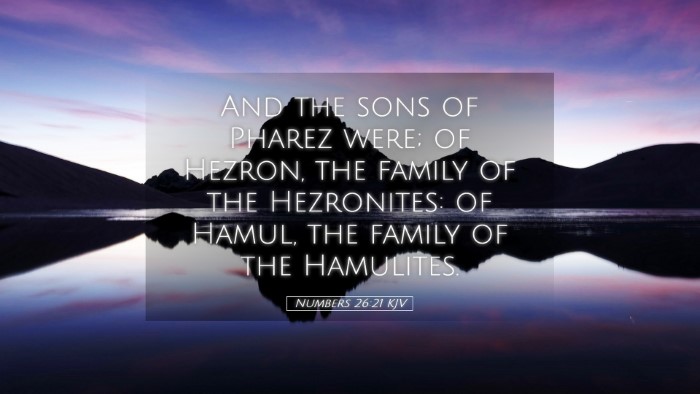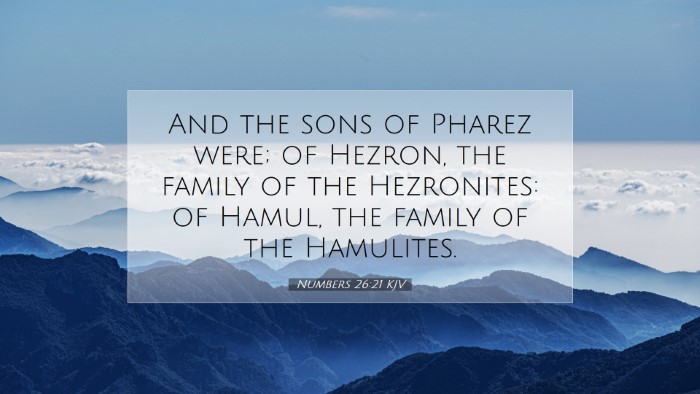Bible Commentary on Numbers 26:21
In this verse, we encounter a pivotal moment in the narrative of the Israelites’ journey through the wilderness. Numbers 26:21 states:
"These are the families of the Zebulunites according to those that were numbered of them, three score thousand and five hundred."
Contextual Overview
This passage is part of a larger census of the Israelite tribes, conducted under the leadership of Moses. The purpose of this census was twofold: to establish the numbers of each tribe and to allocate the lands of Canaan accordingly. The focus on the tribe of Zebulun offers rich insights into both the administrative elements of Hebrew society and the theological implications of tribal identity.
Insights from Commentators
Matthew Henry's Commentary
Matthew Henry emphasizes the significance of the census itself, suggesting that it highlights God's provision and faithfulness. He notes:
- The number of fighting men recorded here indicates not only the physical strength but also the spiritual vitality of the tribe of Zebulun.
- Henry draws attention to the fact that the Israelites were not merely a random assembly of individuals; rather, they were part of a divinely ordered community.
Additionally, Henry points out that the families within the tribe reflect the importance of familial structure in the Israelite culture. Each family unit contributed to the strength, identity, and social fabric of their community.
Albert Barnes' Notes on the Bible
Albert Barnes provides a more detailed analysis of the numbers presented, suggesting that:
- The figure of 60,500 for the Zebulunites reflects a decrease from the previous census in Numbers 1, illustrating the effects of the wilderness experience on the population.
- This decrease is a sobering reminder of the consequences of disobedience and the divine judgment that befell the Israelites during their wanderings.
Barnes also highlights the role of the tribe of Zebulun in the larger narrative, noting that they were positioned favorably for potential territorial gains in the Promised Land, emphasizing the strategic importance of their location.
Adam Clarke's Commentary
Adam Clarke provides unique insights into the significance of the names and roles of the tribes. He reflects on:
- The meaning of the name "Zebulun," which translates to “dwell” or “honor,” suggesting a destiny linked to prosperity and dignity in the settled land.
- Clarke connects the fate of Zebulun to the prophecy of Jacob in Genesis 49:13, which portrays Zebulun as a tribe engaged in commerce and sea trade, highlighting their importance in the economic life of Israel.
Moreover, Clarke reiterates that the population numbers, while impressive, must be understood within the context of God’s overarching plan for His people, reaffirming themes of covenant and divine purpose.
Theological Reflections
The details in Numbers 26:21 serve as a reminder of several core theological principles:
- Divine Sovereignty: The careful accounting of each tribe reaffirms that God was in control of Israel's destiny, ensuring that every tribe had a designated role in His plan.
- Covenantal Promises: The census highlights the faithfulness of God to His covenant promises, as seen in the growth and survival of each tribe despite the trials faced in the wilderness.
- Community and Identity: The emphasis on tribal identities reinforces the idea that God's people are called to identify with each other as part of a larger family, where each individual and tribe has distinct roles and responsibilities.
- Consequences of Sin: The decline in numbers serves as a poignant reminder of the consequences of sin. The wilderness wanderings illustrated the stark reality of disobedience leading to loss, yet it also led to a new generation poised to enter the Promised Land.
Practical Applications for Ministry
For pastors, theologians, and students, Numbers 26:21 offers valuable lessons for practical ministry:
- Emphasizing Community: The importance of relational dynamics within the church mirrors the familial structure of the tribes, encouraging congregations to foster deep, meaningful connections.
- Teaching about Divine Providence: The narrative serves as a template for showing how God works through history, inviting believers to trust in His divine sovereignty amidst uncertainty.
- Addressing the Impact of Sin: The necessity of confronting sin within the church is illustrated by the Israelites’ experiences, reinforcing the need for repentance and renewal.
- Encouraging Future Generations: Ministry should be forward-looking, preparing and equipping the next generation to carry on the faith of their ancestors, much like the new generation of Israelites ready to inherit the land.
Conclusion
Numbers 26:21 encapsulates both the administrative care of God over His people and the deeper theological truths about community, sin, and divine purpose. Engaging with this text invites reflection on our own roles within the greater body of Christ and challenges us to consider how we align with God's calling in our lives.


